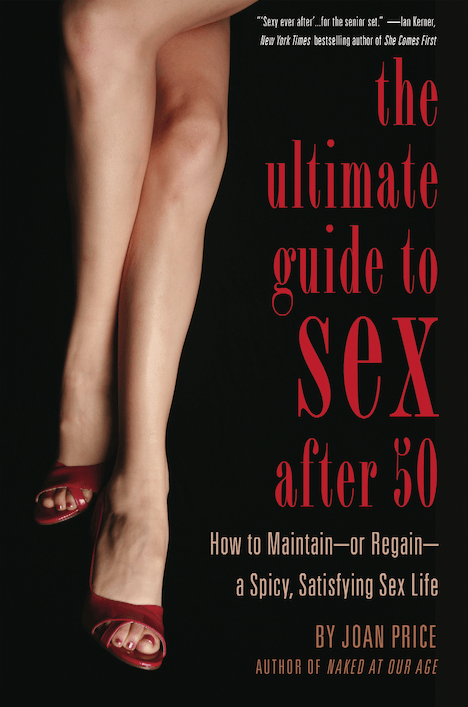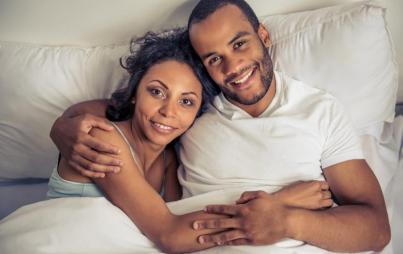
While hot sex is often made synonymous with youth, we all hope, pray, and cross our fingers and toes that we'll be making wow-inducing whoopie til death do us part. (From our mortal coils that is.)
But award-winning author, speaker and sex-positive advocate, Joan Price, has penned a brand new book that offers much than hope; her latest book, The Ultimate Guide to Sex after Fifty: How to Maintain—or Regain—a Spicy, Satisfying Sex Life, proves that the human body—like cheese and wine and everything most delicious—only gets better with age. Price uses candid interviews with doctors, mothers, fathers, sons, daughters, husbands and wives, gay, straight and queer quinquagenarians to champion ageless sexuality.
And Ravishly's got an exclusive first peak at The Ultimate Guide to Sex after Fifty hot off the presses—in fact we've rounded up some of our favorite passages below, which tackle everything from sexual fluidity to the joys of leaving the convent. Intrigued? Get the book right here (available on Valentine's Day of course) or check out Price's blog—Naked At Our Age.
Let's get to business.
* * *
Are We Naturally Monogamous?
"No group-living nonhuman primate is monogamous, and adultery has been documented in every human culture studied-including those in which fornicators are routinely stoned to death. In light of all this bloody retribution, it's hard to see how monogamy comes 'naturally' to our species." —Christopher Ryan and Cacilda Jethá in Sex at Dawn: The Prehistoric Origins of Modern Sexuality
Our society says that monogamy—being sexual exclusively with one committed partner—is right, moral, and what separates humans from animals. But is it truly natural for human beings? If so, why do we struggle so hard to remain monogamous, and so often fail? The book Sex at Dawn—which I highly recommend—makes a strong and well-researched case that human beings are not and never have been naturally monogamous.
We boomers and seniors have widely varying ideas about what is acceptable in a relationship, including whether or not it needs to be sexually exclusive.
Which of these is yours?
· We promise strict monogamy, and breaking that promise would be grounds for ending the relationship.
· We're usually monogamous, but if the right occasion occurs, we have a pass to enjoy a fling, a threesome, or whatever else we've agreed might be delicious.
· One of us has permission to step out of the relationship to satisfy a particular kink or need that the other doesn't share.
· We're in an open relationship, where sex with others is expected and accepted.
· We're in polyamorous relationships with more than one partner.
Twelve years after our last threesome, we still have a sort of standing agreement that if the right opportunity presents itself, we are open to nonmonogamy. The rules for this, still in place, involve communication about who and where.
Personally, I've been monogamous, and I've been in nonexclusive sexual relationships. I'm capable of both, and having lived both ways, I don't condemn either—or find either unnatural.
I know the heady delights of variety: the thrill of discovering and undressing a new lover, and the excitement of responding to pleasure from an unfamiliar touch. I also know the unsurpassed ecstasy of being so deeply in love that I don't want anyone except this one person whom I love. I know the intimacy of freely chosen exclusivity.
Having done both, and realizing that I'm capable of being happy both ways, I've resisted the temptation to fall into "my way is right and any other way is wrong." I also acknowledge that what was right for us when we were younger may not be right for us now, and that something new might emerge for us or our partners that we need to look at with an open mind.
I'm not pushing you to do something you consider repugnant or immoral—I only encourage you to explore what's right for you and not condemn those who choose another path. I hope the information here empowers you to do exactly that.
I'm seventy-four, HIV positive, male, bisexual, and in a relationship with another man. We keep the spark going by having an open relationship. He has another male partner. We cuddle and make love, and although my energy is low, due to age and the toll taken by HIV drugs, the sparks often fly because we're both kinky, and I have a large whips and chains collection!
Sexual Fluidity
I started identifying that I was attracted to women in addition to men when my husband and I were watching adult videos as part of our foreplay.
Sometimes we're not just attracted to someone new-we're attracted to a different gender than in our past. Researcher Lisa Diamond described "sexual fluidity" 
"Some women may be more likely to become aware of their capacity for fluidity later in life because often, at that point, marriage and childrearing don't take up the same amount of time, energy, and attention that they do earlier," Dr. Diamond told me. "Many women have told me that once the children were grown and out of the house, they finally had a chance to prioritize their own needs, interests, dreams, and desires. A growing interest in women—or often, one particular woman—blossomed in that context."
I left the convent because it began to become apparent to me, in a foggy sort of way, that I was attracted to women. I've had sexual experiences with a few males, never satisfactory, and many more sexual experiences with women, very few of which were unsatisfactory. In my opinion, sexuality exists on a continuum. There are those of us that are totally on one end of the spectrum from birth, and we may discover ourselves at different ages after many different experiences.
I remember having crushes on female babysitters from when I was three or four. As a young girl growing up, it wasn't about "below the waist," it was emotional: a longing from my heart, and a desire to be a part of that other female's heart. In my twenties, I was a closeted lesbian, terrified I'd be found out. Now, forty years later, I'm pretty open about my sexuality. Being a lesbian is physical, emotional, and spiritual.
* * *
Stay tuned for more excerpts, and read some other sneak peeks here.






